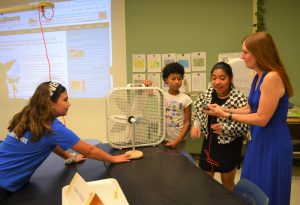
BERLIN – An internationally acclaimed book provided students with insight into global issues while inspiring interest in science during Berlin Intermediate School’s 2019 summer program.
“The Boy Who Harnessed the Wind,” the book based on the true story of a 13-year-old in Malawi who put together a windmill to bring electricity to his village, was the focus of this year’s summer academy at Berlin Intermediate School. Educators linked the book to lessons in language arts and the STEM subjects (science, technology, engineering and math) for the dozens of students who took part in the month-long program.
“Anytime we can tie literature to STEM activities that’s powerful,” teacher Peggy Straight said.
Sixty-five students in fourth, fifth and sixth grade took part in this year’s summer academy, which ran from June 24 to July 23 at Berlin Intermediate. The focus of this year’s session was “The Boy Who Harnessed the Wind,” author William Kamkwamba’s account of putting together a windmill to bring power to his village in Malawi. Teachers worked the story into lessons in various subjects, ranging from reading to science. As the program culminated Tuesday, students in Sheri Ward’s science class tested their own windmills. Ward said they’d spent the last month experimenting, first with spool cars — made with wooden spools, rubber bands and pencils — and then with wind cars and finally tabletop wind turbines. They studied different renewable energy sources, particularly the wind turbines being planned for off Ocean City’s coast, and then experimented with their own small turbines.
“It all leads to real life application and understanding,” Ward said.
She stressed the importance of STEM skills for students.
“They have to figure out how to think outside the box and make things work,” she said. “They need more of that in their life.”
Fifth-grader Lizzie Thompson said building the turbines had been fun.
“I really liked working with my friends in science,” she said.
Milagros Mil-Castro and Sanaiyah Matthews, also fifth-graders, agreed. Matthews said using the wind as a form of power had added another dimension to the projects they’d done.
“It’s more interesting than just building a car,” she said.
While students worked on the science of windmills with Ward they read about Kamkwamba’s own windmill project with Straight, who guided them through reading of “The Boy Who Harnessed the Wind.” Straight said the book helped with vocabulary development and exposed the children to several important themes. It also gave them a glimpse of life outside the United States.
“I think it’s made them very humble,” she said.
Straight said students had been shocked to find out that Kamkwamba and his fellow villagers had survived on one meal a day during droughts and didn’t realize how little of Malawi had electricity.
“The book is challenging but it brought up a lot of good conversation about life outside the U.S.,” she said.
She credited the annual summer academy with providing students with an enrichment opportunity beyond what was offered during the regular school year.
“We often think of the summer academy as reinforcement but I think it’s more like enrichment,” she said. “It takes students to a different level of thinking.”

